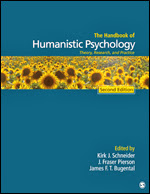EHI and The Handbook of Humanistic Psychology - EHI Contributor Profiles
This blog series highlights an EHI faculty member and/or an EHI affiliated contributing author to
The Handbook of Humanistic Psychology.
The Handbook of Humanistic Psychology
Theory, Research, and Practice Second Edition
Edited by Kirk J Scheider, J Fraser Pierson and James T Bugental
Sage Publications, 2014
This week's profile post features Kirk Schneider and his chapter on Rediscovering Awe. Here is an excerpt:
Chapter 6
Rediscovering Awe: A New Front in Humanistic Psychology, Psychotherapy, and Society, Kirk J Schneider
“I…remember moments that I have been awe awakened; [these were] times that I have been carried out of myself by something greater than myself and to that something I gave myself.”
--Martin Luther King, Jr. (1998, p. 28) from a paper submitted at Crozer Seminary, March 28th, 1951.
Preamble
The purpose of this chapter is to describe an emerging psychospiritual paradigm that veers between dogmatic fundamentalism and postmodern nihilism. This “depth” spirituality is based on a rediscovery of our native capacity for awe, and addresses the very fulcrum of our contemporary lives. It is a spirituality informed by the existential-theological tradition of great political leaders such as Martin Luther King and Mahatma Gandhi, and by great philosophers, such as Soren Kierkegaard, Paul Tillich, Ernest Becker, and Rollo May. This “awe-based” psychology, moreover, welds the zeal and exaltation for religion with the scrupulosity and skepticism of science. Drawing from my recent books Rediscovery of Awe: Splendor, Mystery, and the Fluid Center of Life (Paragon House, 2004) and Awakening to Awe: Personal Stories of Profound Transformation (Jason Aronson, 2009), as well as both film and literature, I explore the nature, power, and therapeutic implications of the spiritual capacity for awe.
Introduction
What if I told you that you are about to embark on a great adventure; that “you, are about to experience the awe and mystery that stretches from the inner mind to The Outer Limits,” a la the science fiction television show from the early 1960’s (Stefano, 1963). But seriously, what if I told you that you are about to experience the terrors and wonders of the cosmos on this adventure; that you will be fully equipped for the journey; and that you will have about eight decades to proceed on it. Further, what if I told you that you will encounter many fascinating events, sensations, and relationships on this journey, and that every day you will have a chance to marvel at, be moved by, and to imagine an entirely new way to live?
And—here’s the clincher—what if I told you that at the end of the eight decades there will be another, even more enigmatic and fascinating journey. Would you want to go? Would you do everything you could to savor the integrity of the entire trek? Would you want to kill, or rape, or devalue yourself or others in the face of this trek? Or stuff yourself with food, or drugs, or “reality” TV? Probably not; at least if sane or sober. Yet this is precisely what we seem bent on doing in our western, industrialized enclave: to defy the awe of living—the humility and wonder, thrill and anxiety of living—and the capacity to be moved.
Excerpt from Chapter 6 in The Handbook of Humanistic Psychology (2nd Edition) Copyright 2014 Sage Publishing Co. All Rights Reserved
What is Awe? In
this video series Dr Lisa Firestone interviews Dr Kirk Schneider for the PsychAlive network and he discusses "What is Awe?" and "Developing Awe in Existential Psychotherapy."
What is Awe?
Developing Awe in Existential Psychotherapy
See more of Dr Lisa Firestone's interviews with Dr Kirk Schneider on PsychAlive Channel >>
Kirk J. Schneider, PhD, Kirk J. Schneider, Ph.D., is a leading spokesperson for contemporary existential-humanistic psychology. Dr. Schneider is recent editor of the Journal of Humanistic Psychology, vice-president of the Existential-Humanistic Institute (EHI), and adjunct faculty at Saybrook University, the California Institute of Integral Studies, and Teachers College, Columbia University. A Fellow of the American Psychological Association (APA), Dr. Schneider has published over 100 articles and chapters and
has authored or edited ten books (all either have been or soon will be translated into Chinese). These books include the recent publications of
The Polarized Mind and
The Handbook of Humanistic Psychology. Dr. Schneider is the recipient of the Rollo May Award from Division 32 of the APA for “Outstanding and independent pursuit of new frontiers in humanistic psychology” as well as the “Cultural Innovator” award from the Institute of Living, Toronto, Canadaa psychotherapy training center which bases its diploma on Dr. Schneider’s Existential-Integrative model of therapy, and an Honorary Diploma from the East European Association of Existential Therapy. Dr. Schneider is also a founding member of the Existential-Humanistic Institute in San Francisco, which in August, 2012 launched one of the first certificate programs in Existential-Humanistic practice ever to be offered in the U.S.A. In April, 2010, Dr. Schneider delivered the opening keynote address at the First International (East-West) Existential Psychology Conference in Nanjing, China, and has been repeatedly invited to speak at various similar venues in China—as well as Japan--over the last three years. He is slated to deliver an opening keynote at the First World Congress of Existential Psychotherapy in London in May, 2015.
Visit Kirk's website >>
Kirk's recent book The Polarized Mind, is available through University Professors Press >>
Read Dr. Schneider's blog Awakening to Awe at PsychologyToday.com.>>
Follow Kirk on Twitter >>
Find more Kirk Schneider resources on his EHI bio page
Related Posts:
Check back for more upcoming posts on "EHI and The Handbook of Humanistic Psychology."



